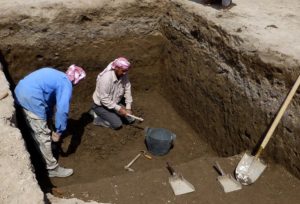Abraham’s Birthplace Uncovered!
 According to the Book of Genesis (11:31), Abraham was born in Ur of the Chaldees, modern Iraq. The Biblical and Rabbinic traditions state that Ur was the center of a mighty empire. At the time of his birth, Abraham’s Ur was ruled by Nimrod, a powerful King. Abraham’s father, Terah, was a general in Nimrod’s army. Originally, Terah had come from Aram-Naharaim, modern day Turkey. He was attracted to Ur by political and business opportunities. The Biblical tradition depicts Ur as a place of materialism, power and intrigue. Tradition has it that for the first three years of Abraham’s life, he hid in a cave because Nimrod’s secret police were looking for him. The Book of Genesis further depicts Abraham as rebelling against Ur’s polytheism and corruption. Abraham adopts monotheism and, at God’s bidding, he leaves the mighty, yet doomed, city of Ur behind and makes his way to the Promised Land, modern day Israel.
According to the Book of Genesis (11:31), Abraham was born in Ur of the Chaldees, modern Iraq. The Biblical and Rabbinic traditions state that Ur was the center of a mighty empire. At the time of his birth, Abraham’s Ur was ruled by Nimrod, a powerful King. Abraham’s father, Terah, was a general in Nimrod’s army. Originally, Terah had come from Aram-Naharaim, modern day Turkey. He was attracted to Ur by political and business opportunities. The Biblical tradition depicts Ur as a place of materialism, power and intrigue. Tradition has it that for the first three years of Abraham’s life, he hid in a cave because Nimrod’s secret police were looking for him. The Book of Genesis further depicts Abraham as rebelling against Ur’s polytheism and corruption. Abraham adopts monotheism and, at God’s bidding, he leaves the mighty, yet doomed, city of Ur behind and makes his way to the Promised Land, modern day Israel.
All this is very specific – polytheism, power politics, wealth, corruption etc. Is it myth or is it history?
Because of dictatorship and war, modern day Iraq, ancient Chaldea, has been off limits to archaeologists. Now, in the post-Saddam era, as relative quiet returns to some parts of Iraq, archaeologists are using spy satellites to do archaeological aerial surveys of the land and to dig at the most promising sites revealed by the satellite images. Suddenly, 4,000 year old Ur – the Ur of the time of Abraham – is being unearthed. Professor Stuart Campbell of Manchester University’s Archaeology Department has just discovered a huge building, probably an administrative center. It’s roughly the size of a football field. Modern computer technology is also being used to analyze data from a hundred thousand written tablets that had been uncovered at the site. Professor Wojciech Jaworski is using sophisticated software to investigate the fiscal data scratched on cuneiform tablets from 4,000 years ago. And what did he learn from all this? He learned that, at least in this instance, the Biblical tradition is 100% accurate. Ur was a place of polytheism, wealth, power and corruption. Isn’t it incredible? The archaeology perfectly reflects a 4,000 year old written tradition!
At the end of the day, it seems that Abraham made his move at the right time. Modern scientists have discovered that Ur collapsed under the weight of its own system. The total monopoly of power strangled the economy and the government ran out of money. It seems that when he moved to greener pastures Abraham sold his property just in time. Who would have guessed that a religious and economic refugee from Iraq would launch the story of Israel and set the world on its path to monotheism.

